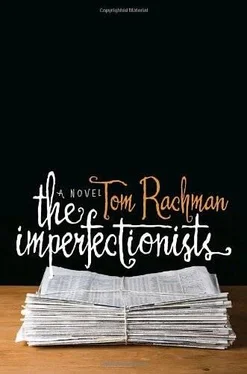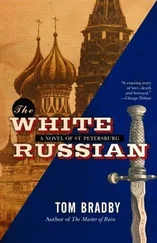When she goes back to her apartment, Rory and his friends are debating which spy agency is the best-MI6, the CIA, or the Mossad. She proceeds past them, her overcoat pocket heavy with the stolen toy. She lays the coat across a kitchen chair and finishes preparing the meal.
The men drink heartily and gorge themselves on everything she brings out, forking in more even as their mouths steam with hot helpings. She herself doesn't eat, instead clattering about the kitchen with dirty pots, opening cupboard doors just for somewhere to stare. Must she mention what she found?
"Rory," she calls out, "I'm so dumb-I left something over at your place."
In the dark of his apartment, she digs her nails under the stickers on the Rubik's Cube. She peels off the squares one by one. The Rubik's Cube is smooth now, plain black. She reaches for the farthest point in his closet and drops the toy. It lands with a clatter on the CDs and the rings that he stole.
Back home, she finds the men boozily debating Guantanamo Bay, flopping forward to make their points and flopping back to listen. She asks if they have everything they need, then excuses herself to the kitchen. She washes her hands, rips off a paper towel, dries herself. She ought to go in there and confront him.
"Hardy!" he calls merrily. "Hardy, where are you?"
"Coming."
She catches sight of herself in the silver kettle and studies the reflection, not recoiling this time. She tucks her carrot hair behind her ear and grabs a fresh bottle of Valpolicella.
On the arm of his chair she sits, watching him struggle with the cork.
"Pop," he says finally, pouring the first dash into his own glass.
"Pop," she says and presses a kiss into his shoulder. No reason to mention anything at all.
1957. CORSO VITTORIO, ROME
The paper increased to twelve pages a day, adding a culture section, Puzzle-Wuzzle, and the obituaries. Circulation broke fifteen thousand, with most of the copies sold in Europe, plus a sprinkling in the Maghreb and the Far East. Despite all predictions, Ott was still there, running the show.
His life, beyond the paper, was lived alone on the Aventine Hill in a sixteenth-century mansion that he had bought from an impoverished Italian noble family. The place was four stories of stone, painted orange and brown, with long yellow shutters, giving the impression of habitable marzipan. A spiked fence surrounded the property, and maids and cooks and odd-job men made their way in and out through the squeaky front gate. Inside, the ceilings were covered with frescoes of a highly sentimental nature-cheeky cherubim and plump lovers frolicking by waterfalls. Ott disliked these and was tempted to have them painted over.
However, he rarely looked upward, focusing instead on the walls, which he covered with paintings. His proclaimed interest was financial- Europe was full of bargains after the war, he said. But it was Betty who adored art. During her years in Rome, she had become passionate about paintings, haunting Renaissance churches to study dimly lit masterpieces, or using her press pass to sneak into newly opened art exhibits. So Ott made her his counselor: whatever she admired, he bought.
They frequented a private gallery near Quattro Fontane run by a flamboyant Armenian emigre named Petros, whose chief preoccupation was the provenance of works rather than their artistic merit. He listed illustrious past owners and recounted barely credible tales of how the pieces had ended up in his hands: train wrecks in Chungking, cutlass duels in the Crimea, pouches of counterfeit rubies. He rarely deigned to identify the artists, so Betty conveyed this detail to Ott: "That's Leger, I think. Not sure about this one. But that's Modigliani, for certain. And this is a Turner."
Betty even decided where in Ott's mansion each work should hang. She nudged the frame a little to the right, a little to the left. "Straight now?"
He stood a distance back, studying the shipwreck by Turner, all swirling doom and sinking sailors. "Tell me what's good about this one," he said.
She took a step back and, hand on hip, strove to explain. Her confused answer-he half smiled as he listened-grew all the more fervid as clarity failed her.
"If you don't get it," she concluded, "well, then, you just don't get it."
"Who says I don't?" he responded, winking. "Maybe I just like watching you tell me."
Downstairs for lunch, Betty placed a vast mozzarella di bufala upon a plate and fetched the carving knife and fork. Poised above the cheese, she paused, not looking up. "What," she asked, "are you doing out here?"
"The paper," he replied.
"I know, but…" She inserted the fork: a milky pool expanded across the plate.
He took the cutlery from her hands, speared a piece, and fed it to her off the knife.
"GLOBAL WARMING GOOD FOR ICE CREAMS"
CORRECTIONS EDITOR-HERMAN COHEN
HERMAN STANDS BEFORE THE COPYDESK, TORCH-EYES PASSING over the three editors on duty. They halt in mid-keystroke. "And I haven't even accused anyone yet," he says darkly, opening that morning's paper as if it contained a murder weapon. What it does contain is worse: a mistake. He touches the error with contempt, pokes at the despicable word, as if to shove it off the page and into a different publication altogether. "GWOT," he says. He slaps the page, shakes it at them. "GWOT!"
"G what?"
"GWOT!" he repeats. "GWOT is not in the Bible. And yet it is here!" He jabs the article, driving a sausage finger through page three.
They deny responsibility. But Herman has infinitely less time for pardon than for blame. "If none of you nitwits know what GWOT means," he says, "then why is GWOT in the paper?"
An arctic silence settles upon the copydesk.
"Have you read the Bible?" he demands. "Any of you?" He glances at the sorry trio of copy editors before him: Dave Belling, a simpleton far too cheerful to compose a decent headline; Ed Rance, who wears a white ponytail-what more need one say?; and Ruby Zaga, who is sure that the entire staff is plotting against her, and is correct. What is the value in remonstrating with such a feckless triumvirate?
"Sooner or later…" Herman says, and allows the partial threat to hang there. He turns from them, prodding the air. "Credibility!" he declares. "Credibility!"
He elbows into his office, and the momentum of his belly topples a stack of books-he must tread with caution in here, for this is an overstuffed room and he an overstuffed man. Reference works clutter the room-classics like Webster's New World College Dictionary, Bartlett's
Familiar Quotations, National Geographic Atlas, The World Almanac and Book of Facts, along with idiosyncratic tomes like The Food Snob's Dictionary, The Oxford Dictionary of Popes, Technical Manual and Dictionary of Classical Ballet, The Visual Dictionary of the Horse, The Complete Book of Soups and Stews, Cassell's Latin Dictionary, Albanian-English/English-Albanian Standard Dictionary, and A Concise Dictionary of Old Icelandic.
He notices a gap on the shelf and searches the book skyscrapers rising from the floor for the missing volume. He locates it (A Dictionary of Birds, Part IV: Sheathbill-Zygodactyli), slides it back into place, hikes up his belt, lines himself up with his desk chair, and inserts his bottom-one more bulky reference work returned to its rightful home. He drags the keyboard to his bunchy gut and, condescending to the screen, types a new entry for the Bible:
* GWOT: No one knows what this means, above all those who use the term. Nominally, it stands for Global War on Terror. But since conflict against an abstraction is, to be polite, tough to execute, the term should be understood as marketing gibberish. Our reporters adore this sort of humbug; it is the copy editor's job to exclude it. See also: OBL; Acronyms; and Nitwits.
Читать дальше












